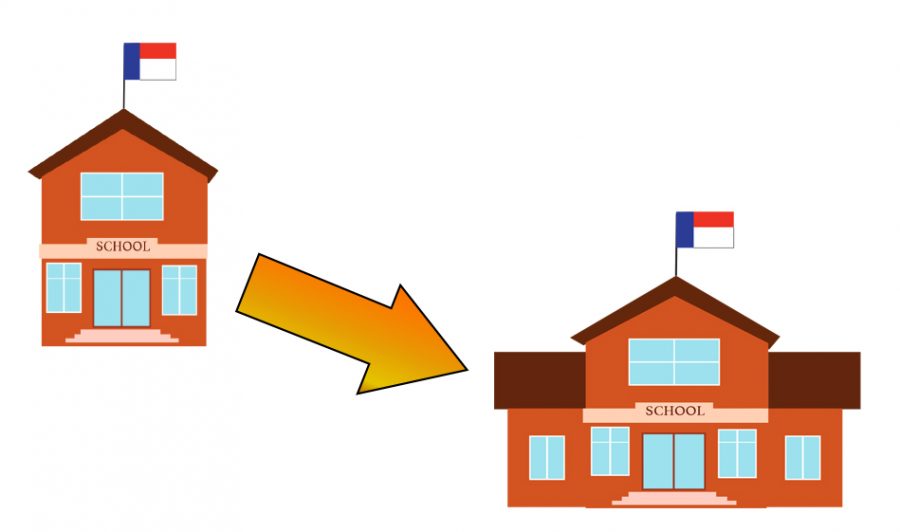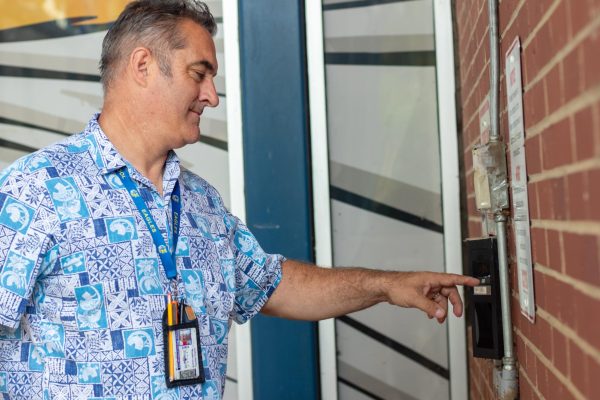High school athletic transfers corrupt competition
Photo by Jack Meltsner
The buzzer sounded as the South Central High School basketball team ended their 2019-2020 regular season with a loss to D.H. Conley, finishing the season with a 17-6 win-loss record. Or so they thought.
The team was found guilty of providing a false address for a player who lived outside of their district and was penalized by the North Carolina High School Athletic Association (NCHSAA).
High school and collegiate athletics are the last form of pure, organized competition in America. With the recent influx of collegiate athletic transfers along with the transfer portal, the college game, and subsequently the high school game, have been professionalized by deep-pocket corporations. Money is poured into college programs and now holds a strong influence on where players transfer. This trend has leaked into the high school game, especially in North Carolina.
At the high school level, internal transfers have taken athletics by storm. Across the state, schools have been accused of recruiting athletes to attend their school by exploiting a loophole in the NCHSAA policy or by forging their addresses to make the student appear to live within the school’s district.
“It seems like kids nowadays don’t want to stay [at their zoned school] and work and build something from the ground up,” East Meck athletic director Jason Fowler said. “A kid feels like they’ll have a better opportunity if they go to a program that’s historically winning.”
In the eastern part of North Carolina in Pitt County, the South Central High School Falcons were forced to forfeit 10 games because of allegations raised by a community member, calling a player’s residence and eligibility in the district into question. An investigation by Pitt County Schools found the Falcons guilty of providing an incorrect address for a highly skilled basketball player.
The NCHSAA residency rule states: “A student is eligible to participate at the school to which he or she is assigned by the local board of education, within the administrative unit of residence — any change in residence must be bona fide, which means made, done, or presented in good faith; without deception or fraud – in no case will any exception be made to the following principle: Change of schools must be contemporaneous with the change in residence.”
This NCHSAA policy has been loosely enforced over the past 10 years until South Central’s infraction this winter. In Mecklenburg County, the state’s largest county by population, breaking this rule is commonplace for high profile athletic programs — yet CMS has failed to take significant action. These programs recruit players from lesser-known schools and offer them a greater chance to win, better athletic facilities and more exposure to college scouts and coaches. It’s an opportunity for the player that is hard to pass up.
“Kids feel like they’re gonna get more exposure if they’re at a more high profile program,” Fowler said.
The Southwestern 4A conference is no stranger to this policy. In 2010, the Butler high school varsity women’s basketball coach was fired for recruiting players to transfer to Butler from a rival school. Also, a few years ago, after East Meck running back Khamal Howard picked up back to back conference player of the year awards for the Eagles, he transferred to Myers Park for his senior season.
The larger schools either falsify the players’ address or find a loophole in the system to bypass NCHSAA’s regulations. This sounds like a great opportunity for a talented athlete at a small school, however, it is illegal for the larger school. The schools with extensive booster club support have the resources necessary to “buy” the player a spot on the team.
Not only is this unfair to the smaller school that the player came from, but it is also unfair to the teams that compete against the high profile schools who don’t engage in illegal practices to better their athletic teams.
A larger school should not have the privilege of bringing in players from outside their district while other teams work with what they have to manufacture wins and not roster spots.
CMS must do something about this outbreak of athletic transfers or our high school game will be professionalized, just like college athletics.
“You [teams] have who you have… If you’re in the district, you take the kids that are yours and that’s who you play with. That’s the right way to compete.” Fowler said.
Your donation will support the student journalists of East Mecklenburg High School. Your contribution will allow us to purchase equipment and cover our annual website hosting costs.











